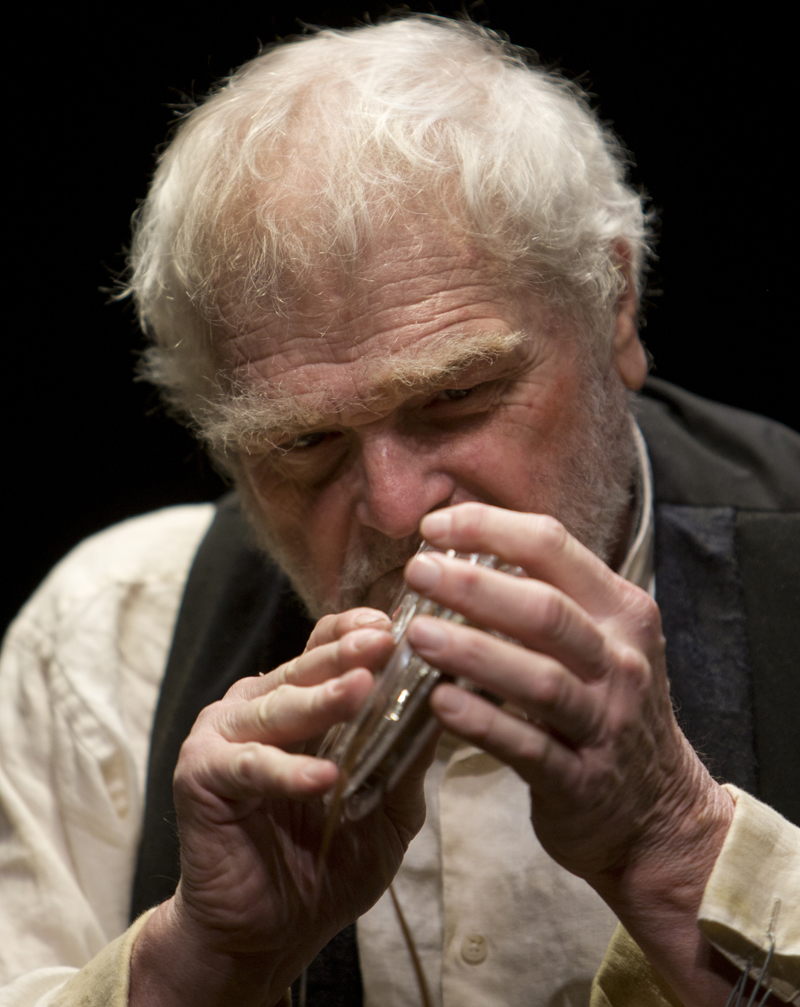
The tale of the tape: Brian Dennehy in Krapp's Last Tape at the Long Wharf Theatre through Dec. 18. Photo by T. Charles Erickson.
My Krapp’s Last Tape review has been postponed due to technical difficulties.
One of the show’s central voices emanates from a reel-to-reel tape machine. The backstage wizardry guiding the disembodied voice of that antiquated onstage device malfunctioned last night about a third of the way through the show. The performance had to be stopped, and there was a confusing and disorienting ten-minute break before it could resume.
Unfortunately for the Long Wharf Theatre, which is presenting the Samuel Beckett one-act through Dec. 18, last night was opening night. The computer glitch has been corrected, and Long Wharf has graciously invited the many theater critics there last night to attend future, uninterrupted, performances.
I would caution you to read between the lines of any reviews which do result from that glitched Thursday show. The sole human actor in the piece, Brian Dennehy, got back into Krapp’s rhythms swiftly and expertly. but Beckett plays are fragile, and an unplanned break can’t be smoothed over in a viewer’s mind very easily. Considering that Krapp’s Last Tape only takes 50 minutes to perform, a 10-minute delay can have a seismic impact.
This was no mere broken prop item or skipped passage of dialogue. This was a computerized sound breakdown which (from what I could tell) foisted the wrong bit of recorded tape on Dennehy, who had no choice but to stop the show. It’s not like there was another live actor he could gingerly guide back into the dialogue.
“OK, folks, we’ve got a problem here, “ Dennehy casually announced. “This has nothing to do with Beckett. It has to do with Thomas Alva Edison.” After some public chatting and gesturing with the techies in the sound booth, Dennehy calmly declared that “I’m going to leave the stage now.”
Then came a houselights-still-down, what-the-heck interlude where the theater’s artistic director and managing director left their seats to see what was wrong, each returned, then left their seats again. One was overheard saying “We’ll have to start the show over again.”
Finally, Artistic Director Gordon Edelstein declared that “a computer problem” was the source of this long non-Beckettian pause, and that the show would resume shortly, backed up to an earlier point. It restarted in fact at the first taped moment, “39 today.” There were no more technological surprises after that, except for the ones in the script.
Samuel Beckett maps out the movements and relationships in his plays with intense precision. When directors and actors make too much of the playwright’s economy and exactitude, the shows can become tedious and mechanical. That’s certainly not the case with this production, which is directed by Jennifer Tarver and which Brian Dennehy has been performed at the Stratford Shakespeare Festival and the Goodman Theatre prior to this Long Wharf stint. It’s warm and human and funny and tender. So it’s ironic that the machine would upstage the man.
Interestingly, the last one-person, hour-long Beckett piece to play on Long Wharf’s Stage II stage was the Gare St. Lazare Players’ adaptation of the story First Love, a production similarly noted for its humor, humanity and vulnerability. First Love’s performer Conor Lovett distinguishes himself from most Beckett performers by acknowledging the audience and exhibiting an awareness of the stage environment. If someone in the audience sneezes, Lovett says “Bless you.” If a fly buzzes about him, he swats at it.
Which is just how Brian Dennehy behaved last night. With remarkable and admirable restraint, he simply noted the insurmountable difficulty he was encountering, stayed onstage in hopes that it could be fixed quickly, then did the professional thing of gracefully egressing so the issue could be resolved. If this were a less ambulatory Beckett piece, such as Happy Days or Endgame or Play, the leading actors might literally be stuck—in a hill of rubble, or a garbage can.
The question remains, how long could have he chosen to go without mentioning the problem? I’m sure that the tape screw-up could have been much, much worse before most of the audience would have realized something was wrong. This is a Beckett play, after all, with repetitions and abrupt turns and abstract intrusions, defying and mocking expectations. Even Beckett enthusiasts such as myself find it easy to lose their place when seeing his plays in performance, luxuriating in simply hearing these oft-read scripts actually spoken and staged.
In any case, expect a full review of Krapp’s Last Tape here at NHTJ later in the run. And reuminate on the fact that analyzing, overcoming and laughing at past missteps and indiscretions is part of what this wonderful play is all about.
